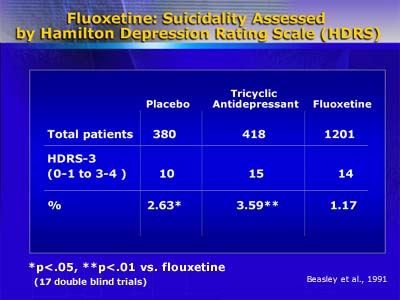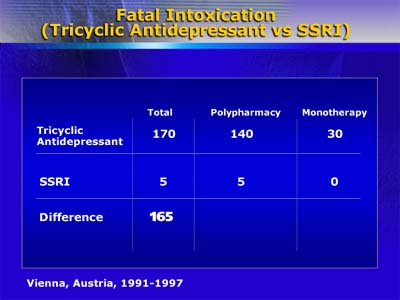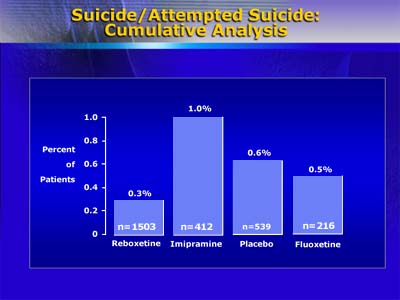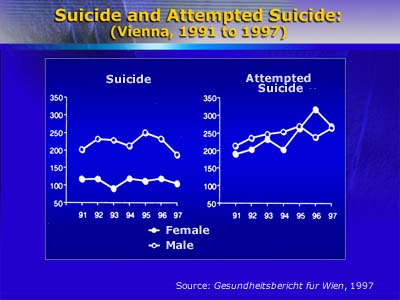Dr. Kasper asks
(1) Whether antidepressant medication may lower depression or suicidality ratings;
(2) Whether antidepressant medication may increase suicide risk in the short term; and
(3) Whether suicide risk is associated with toxicity of antidepressant overdosage.
He cautions that studies of depression generally exclude patients with significant suicidality, which may affect generalizability of findings. Nevertheless, addressing his first query, Dr. Kasper points out that fluoxetine has been reported to reduce ratings of the Hamilton Depression Rating Scale suicidality items significantly more than do tricyclic antidepressants or placebo.

Moreover, a double-blind comparison of paroxetine and placebo found significant differences favoring paroxetine in a subgroup of 91 depressed patients: paroxetine was associated with significantly lower ratings of suicidal behavior in patients with lifetime histories of fewer than five suicide attempts. (Ratings of suicidal behavior were similar between treatments in patients with five or more lifetime suicide attempts.) Consistently, a study of fluvoxamine also has reported reduction of suicidal behavior.

Addressing his second question about whether antidepressants may increase suicide risk, Dr. Kasper describes a study that he and his colleagues conducted in Austria. That study found more fatal intoxications involving tricyclic antidepressant overdose than SSRI overdose, consistent with a possibility that SSRI's may not be associated with increased suicidal behavior. Also consistent with that possibility is another study that found similar proportions of reboxetine- or SSRI-treated patients among a group of patients who attempted or completed suicide.

Attempted suicide/suicide twice as common with placebo, imipramine and fluoxetine compared with reboxetine.
Dr. Kasper points out that the suicide rate is markedly higher in males than in females, despite a two-fold higher rate of depressive disorders in females. He explains this apparent discrepancy by citing differences in how depression manifests in men and women. Men, he points out, are more likely to manifest depression atypically, with lowered stress tolerance, acting out and aggressiveness, low impulse control, irritability, abuse, and antisocial behavior. Accordingly, the DSM-IV criteria may be less sensitive for detecting depressive disorders in men than in women, leaving more men untreated and therefore at greater risk for suicide.
